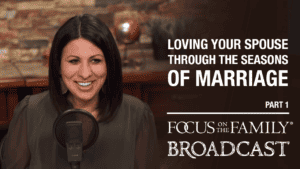
Engaging Hearts and Minds in a Broken Culture
This discussion offers a preview of Volume #16 “Cultures in Conflict” from the That The World May Know video series, available below.
Home » Episodes » Focus on the Family Broadcast » Laughing, Loving, and Lasting With Your Spouse
Excerpt:
Kevin Thompson: Marriage is gonna have its hardships. Some are gonna be self-inflicted; some are just – we’re fallen people that live in a fallen world. And if we had this ability to endure together, to trust God in the midst of the difficult seasons, he is going to bless us in ways that we can’t even begin to imagine.
End of Excerpt
John Fuller: That’s Kevin Thompson, and he’s with us today on Focus on the Family. Your host is Focus president and author Jim Daly. And I’m John Fuller.
Jim Daly: All right. John, here’s a question for you. Do you and Dena laugh a lot?
John: Oh…
(LAUGHTER)
John: We try.
Jim: Right there.
John: OK. So my goal is to help her laugh at least once a day because of some bad joke or a pun or, a lot of times, it’s just a funny memory that I can pull up from our early years.
Jim: That’s a good goal. I like that goal.
John: Yeah, well, it – yeah. Well, uh, you could – you could adopt it.
Jim: (Laughter).
John: Let me know how that works.
Jim: Tickling doesn’t count, right?
John: I…
Jim: (Laughter).
John: Not for her it doesn’t, no.
Jim: Well, we’ve kind of learned that, too. I think humor is so important in marriage, uh, really, to get through some even rough spots. It’s fun to…
John: Absolutely.
Jim: …Sometimes let some of the pressure out and make light of a situation when the timing’s right. There are inappropriate times to do that too.
John: Yes (laughter).
Jim: But you know what? Here at Focus on the Family, we want to give you a marriage tune-up. And, you know, this is the – the moment where your marriage is in a pretty good place, but you can always do a little better. That’s the kind of nuts-and-bolts information we’re gonna give you today. Uh, we help couples every day with challenges in their marriages. And I thank you, the supporters out there listening, for stepping up and helping us to do that day in and day out with counseling, intensive programs for marriage, all the – the tool kit that we have for everybody to tap into. Today, we want to help you learn how to make the overall tone of your marriage happier and more committed. And I think that’s a great goal. We’ve invited Kevin Thompson, author of Happily: 8 Commitments of Couples Who Laugh, Love & Last, to give us some insights into marriage.
John: Yeah, and Kevin is the lead pastor at Community Bible Church in Fort Smith, Arkansas. Of course, he meets and counsels with couples, uh, in that role. He, uh, is also a marriage and parenting conference speaker. He’s a blogger. And he’s married to Jenny, and they have two children.
Jim: Kevin, welcome to Focus.
Kevin: Well, thanks so much for having me.
Jim: For the first time.
Kevin: First time.
Jim: Now, you’re a pastor.
Kevin: I am.
Jim: …First and foremost. So you’ve seen a few couples in trouble.
Kevin: Oh, there’s no doubt. The pastor is fascinating from a relationship standpoint because you were – you were there from the very beginning, when couples begin to date, and sometimes you’re making calculations of whether or not that’s going to make it or not.
Jim: But you never speak of this.
Kevin: Never. You always hold that.
Jim: (Laughter) This is just…
John: How accurate are your predictions?
Kevin: Always – well, you know, I do have – there’s only one place in which I make predictions to Jenny, my wife, and that is with the wedding cake. And so it’s not with dating, but it’s with the wedding cake at the – at the, uh, reception. And I have – I have found that if you will watch that, you can begin to see if the couple’s going to make it or not. Now, it’s not whether or not they smash the cake or don’t smash the cake. But one of my very first weddings I did, the, uh – the couple did the she gave him some cake, and it was really smooth, and he gave her some cake and really smashed it in. And you could tell she was irritated. And then she smashed it back, and then he got irritated. And then they actually went to the ground. And I looked at the person I was standing next to, and I said, “Is that normal?” because this was only at my second wedding.
Jim: (Laughter).
Kevin: And that couple was divorced within six weeks.
Jim: Aw, that’s sad.
John: Six weeks.
Kevin: Six weeks.
Jim: So this is the predictive model.
Kevin: No.
Jim: (Laughter).
Kevin: So it’s not whether or not you smashed or not; it’s whether or not is there respect in that moment? Is there playfulness in that moment?
Jim: Wow.
Kevin: And so to this day, whenever – whenever somebody sees me at the reception, they’ll look at the wedding cake, and then they’ll look back at me to see, and I’ll just give kind of a thumbs up, thumbs down of what I think (laughter).
Jim: (Laughter) So it’s become a bit of a game.
Kevin: It’s kind of a – it’s kind of a game.
Jim: In a good way. Well, um, share with us – you mentioned Jenny, your wife. Um, you know, let’s start with your own (laughter) – how did you meet? What happened? And did you smash the…
John: And how’d that cake thing go? Yeah.
(LAUGHTER)
Kevin: Very gentle with the cake. So – so Jenny and I went to Oklahoma Baptist University together. I actually met her before I went, but she completely blew me off. And so I was speaking at her church. Uh, my joke is, she was the only female there over the age of 14 and under the age of 40. And I asked a friend to introduce me, and, uh, he did. He introduced me and said, “Jenny, this is Kevin Thompson. He’s going to go to OBU next year.” She was already there. And, uh, she goes, “Oh, that’s great. You’ll have a great time” and walked off. And that was our initial meeting. And two years later, we were reintroduced. And, uh, then I asked her out. We begin to date, and…
Jim: Had you ever forgotten about her?
Kevin: No.
Jim: (Laughter).
Kevin: Oh, by no means.
Jim: OK. I’m just making sure.
Kevin: Well, I went to OBU just with one focus, and that was to find her again.
Jim: (Laughter).
Kevin: And, uh…
Jim: Wow.
Kevin: …To make sure I made her mine. And so on our very first date – uh, I asked her out. And she told me that she would never marry a pastor, she would never move for a man, and she would never marry somebody younger than her. And, uh, two years later, all three of those things were found false.
Jim: (Laughter) It’s funny that you kept that checklist.
Kevin: That’s – oh, and I remind her often.
(LAUGHTER)
Jim: OK. Maybe we need to help you.
(LAUGHTER)
Kevin: That’s exactly right.
(LAUGHTER)
Jim: No, this is fun. Your grandparents were married maybe as long as any couple I’ve ever heard of. But how many years?
Kevin: That’s exactly right. So we – we buried my grandmother on the 70th anniversary of the day my grandfather went to get the marriage license.
John: Oh, my.
Jim: Wow. I mean, that is a long time. What did you learn watching them?
Kevin: You know, to me, my mammaw and pappaw (ph) were inseparable. I can’t even say mammaw without saying pappaw. And my grandmother was the strongest person I’ve ever met. I’ll never forget. She’d pull the biscuits out of the oven and half the time wouldn’t even use a potholder.
(LAUGHTER)
Kevin: And I didn’t understand it.
Jim: Seriously, this isn’t walking both directions uphill to school.
Kevin: No, no.
Jim: (Laughter).
Kevin: She literally – I mean, whenever you think about what it was like to be born in the in ‘20s in America in Arkansas…
Jim: She was tough.
Kevin: She was tough. My grandfather was the most gentle person I’ve ever met. And so when I think about toughness, I think about mammaw. When I think about gentleness, I think about pappaw – and married 70 years, inseparable. My grandmother never pumped her own gas. Pappaw wouldn’t let her. That was his job.
Jim: Right.
Kevin: And I don’t think my grandfather ever poured his own coffee – that’s what mammaw did. So they had these very traditional roles, no doubt, that a lot of those were generational and all those kind of things. But they had a connection with each other. That was just something I wanted to aspire to. I’ll never forget. We do the funeral, and I’m standing there looking down at my grandmother. And somebody comes up and looks down who is very close with her, as well. And she looks down and this person said man, 70 years of marriage. They were lucky. And I thought to myself, how true is that? They were lucky. But then I got to thinking, you know what? They kind of made that luck. They kind of made some choices here that it wasn’t just a flip of a coin. It was literally the flip of a will where they chose to be committed to each other. And, yeah, they were lucky, but they also were born in the midst of depression. They also went through several wars. They also had the trials of raising kids, of going through economic depressions. They were lucky in the end. But I bet it didn’t always feel lucky. So I just begin to investigate what is it that really made this for them. And there were people of tremendous faith. And the more I got into it, the more I began to see in many ways they lived out the kingdom ethic within their marriage. And to me, you think about it. God’s Kingdom, what we’re going to experience one day in heaven, the kingdom ethic is laid out in the Beatitudes.
Jim: Yeah.
Kevin: If that works for the kingdom, why doesn’t that work for marriage?
Jim: OK. You know, there are hundreds of thousands, millions of people listening. Um, is happiness in marriage attainable?
Kevin: Absolutely.
Jim: And I don’t know what the percentage might be, but there’s gonna be a large percentage of people that don’t feel that.
Kevin: No, and understandably so. And by no means, do I ever think that happiness is the ultimate goal. I think that’s one of the great struggles with modern life, modern viewpoints of marriage, secular viewpoints of marriage, is they think that personal happiness is the No. 1 goal. And so if I don’t have it, if I’m not experiencing it, I just need to find somebody else and move on and go in some other way. I don’t think that’s the – the viewpoint at all. At the same time, in the church, if we’re not very careful, we can deny the presence of happiness in a marriage and just say, “Well, I’m just called to suffer for the Lord,” and never experience the fulfillment of this relationship, of what it could possibly be. Whenever you think about Jesus, don’t you think he was happy?
Jim: There’s – there’s a joy there that is clear.
Kevin: Clear. He suffered in unimaginable ways, had tremendous feeling, obedient – no doubt. But there was this sense of joy. You – you picture Jesus with the children, right? You picture Jesus even with women, as they were looked down upon in that society.
Jim: Right, the sinners.
Kevin: And just giving them a sense of life in some way. I don’t think happiness is the ultimate goal of a marriage, but I do think it is the natural byproduct that comes when a couple is committed to each other and finds joy in the Lord.
Jim: No, that is good. You use the term in your book, contagious, that divorce is contagious. I don’t like that. But tell me why you chose to use that term.
Kevin: I don’t like it, but I don’t doubt it.
Jim: Right.
Kevin: Because I see it in churches. I see it – we’ll have Sunday school classes, home groups, where there’ll be a series of divorces that all of a sudden happen. And I think it’s the concept – it could be the concept of, divorce oftentimes is the byproduct of a series of poor choices. And so if you surround yourself with people who are making poor choices, you’ll probably make some of those choices as well.
Jim: That – no, that’s a good observation. And that influence that, um, men and women have on each other, I mean, that’s what you’re talking about.
Kevin: Oh, no doubt. And by no means do we ever want to see somebody struggling in their relationship. “Oh, they’re contagious. We gotta stay away from them.” By no means am I saying that.
Jim: Right.
Kevin: But what I am saying is, you have to show some intention within your own relationship to make sure that you also – as you’re ministering to people and being friends with people who are struggling, you’re also strengthening your own relationship by surrounding yourself with people with good marriages.
Jim: No, that’s good, and it’s a good way to think of your friendships and what you want to develop in the way of healthy friendships. Alright, let’s get to it. You identified eight, uh, commitments from the Beatitudes, of course found in the Gospel of Matthew. Touch on each one of those eight, just lightly, and tell us why it’s important to demonstrate, for example, humility in a marriage.
Kevin: It – it all begins there for me. It’s – blessed are the poor in spirit. Jesus is basically saying, “Blessed are the spiritual beggars in God’s kingdom.” There’s a value to recognizing that you don’t have it all and that you need help. Where else does marriage begin but then with this recognition of, I have no clue? Marriage to me is this beautiful thing where you have these two people who know nothing about what it means to be married, how to live with each other, and they’re going in it together, and they’re – and they’re called now to figure it out. To me, that’s one of the most beautiful aspects of marriage, is we are equally ignorant, and yet we’re gonna figure it out together. And if you show me a couple, show me an individual, who’s willing to recognize their own ignorance, their own inability, and then to get help and to read and to study and to learn, there is no limit on what they can become and what they can do.
Jim: To help those couples struggling in this area, when is there or what kind of sign is there for pride slipping into the marriage?
Kevin: Yeah. I mean, pride is what kills marriage, right? And…
Jim: What does it look like?
Kevin: And a marriage will thrive in humility. It’ll die in pride. I think about several things. We can look in our own lives. How does pride look to us? Now, I think about – if everything becomes personal, that’s pride. Now, all right, if your wife doesn’t like how you loaded the dishwasher, and you don’t look at that as, we have a disagreement over how to load the dishwasher, you feel that as a personal attack. That’s pride. You’re just disagreeing over dishes. But if you feel that personally, that’s pride. If your wife can’t influence you – you know, if Jenny right now says, “Kevin, you need to leave Colorado Springs right now.” All right, I might ask her why, but if she’s really dogmatic about it, I’m leaving. Like, I trust her. I know she’s for me.
Jim: Something’s going on.
Kevin: And I know she loves me. And even if she’s wrong, she really hasn’t been before (laughter). And so I’m out of here. But for a lot of people, their spouses cannot influence them. Their opinions are what their opinions are, and their spouse has no say in that. That, to me, is an evidence of pride.
Jim: Yeah.
John: You know, the Lord has been really good – I think he has dismantled my pride partly through my wife.
Jim: (Laughter).
John: I mean, in a good way. She has called me out on some things. And it isn’t always easy to accept that. But I appreciate what you’re saying. Our guest is Kevin Thompson. This is Focus on the Family. Kevin’s written a great book, Happily: 8 Commitments of Couples Who Love – 8 Commitments Of Couples Who Laugh, Love & Last. And of course, we’ve got copies of that. And then Jim mentioned a variety of resources we have here at Focus for you, regardless of where you’re at in your marriage. Stop by our website for more – focusonthefamily.com/broadcast.
Jim: …Um, I think. Uh, let’s get the second commitment. It’s embracing the hurt. You had, uh, to deliver, I think, some difficult news to your grandfather. What happened?
Kevin: Yeah. I was – I was the one who – who let my grandfather know that my grandmother had died.
Jim: Oh, that is hard.
Kevin: And so I actually drove him – he had always been the one in bad health. She’d always been the healthy one. She died at 90. And she was a little irritated by it because she always thought she was going to live to be a hundred. And she was kind of shocked. And I was like, “Mammaw, you’ve lived eight years longer than the expectation here.” But she said, “Yeah. But I’ve lived 10 years shorter than what I thought.”
Jim: (Laughter) Oh, man.
Kevin: And so I’ll never forget driving my grandfather up to make the last visit. He was frail. And I had to be the one to take him. I’ll never forget. We were driving, uh, to the hospital. It was right after work. And all of a sudden, he says, “Hey, Kevin. Look at that sunset.” And I looked up. And sure enough, the sun was setting over Oklahoma. It was as beautiful as can be. And I thought to myself, “How did he see that?”
Jim: Huh.
Kevin: He’s about to go see his wife of 70 years for the last time, and he knows it. How did he see that? That was just who my grandfather was. He had the ability in the midst of experiencing the bad to see the good.
Jim: His eyes were open.
Kevin: His eyes were open to see it. And so we went and had that visit. I brought him home. And the next day, she died. And I was the one that came home and leaned down, uh, before him and let him know that – that she was gone. And it was such a tremendous honor, uh, to do so and yet such a tremendous heartbreak to see the man that I so love suffering in such a way. And yet this idea of, within love there comes this hurt and this pain and this sorrow, and we live in a time in a society that avoids that…
Jim: Yeah.
Kevin: …At all costs. You know, back in the old days, you lived out on the farm. Animals lived, and they died. You were there for birth. You were there for death. Uh, when a loved one died, they – they were – the body was kept in the home. The funeral was there. The visitation might be there. Now we are distanced from all of that to such an extent that people get very uncomfortable, uh, around discomfort and around pain. And this is the chapter that surprised me the most about the book. This is one of the reasons I love to write – is you always hit on something. It’s not that I have all this knowledge and I’m giving it. It’s, I’m out there searching. God has put truth in the world.
Jim: Observations.
Kevin: I’m searching for it. And this is something I would never have thought of that can create a healthy marriage and actually lead to happiness. But the idea that we are fallen people in a fallen world – “I’m a broken person. I can never fully be the spouse my wife deserves. She can never fully be the spouse that she wants to be for me” – marriage itself is going to disappoint at times. But as we lean into that, recognize that, mourn that, it actually empowers us to appreciate the good that we have. And yet if we are constantly denying the sorrow, the sadness, the heartache, we are actually, in so doing, also denying the joy and the gratitude and all the good things that are there. This is the chapter that – that, in my opinion, every single person needs to read because I think it’s an idea that I’ve never seen before.
Jim: Yeah. And Kevin, No. 3 would be to avoid both apathy and aggression. I mean, this probably hits a lot of people. So what do you mean?
Kevin: It – it really is – I’ve seen other writers, uh, put it in other ways. Uh, to avoid silence and violence would – would be a concept here. To me, those are two different ways of getting the same poor result.
Jim: Right.
Kevin: And so some – some people – men specifically – can be apathetic if we’re not very careful.
Jim: Right, disengage.
Kevin: Disengaged from the relationship, from the concept – we can be very engaged at work or in our hobbies and definitely football season – you know, is going on and that kind of thing. But from our marriage, we tend to be a little bit more apathetic, uh, whereas others, at times, are overly aggressive. And so, “All right. If you want to have the discussion, we’ll have the discussion. And I’ll come at it in such an aggressive way, you’re not going to open up your heart. You’re gonna have to get defensive in every way possible.” To me, this is where meekness comes into play, the ultimate definition of Jesus in so many ways – uh, that he had this gentleness about him. He would never avoid the discussion that needed to be had. And yet, at the same time, he would come at it with a gentleness that would create this climate of safety. You know what’s a funny thing? You can talk about anything to anyone if you feel safe. If you feel like they’re not going to use it…
Jim: Correct.
Kevin: …Exploit you in some way, manipulate you, you can talk about anything. And so if you can create that with your spouse – and the way to do that is, I’m not going to be apathetic. If the conversation needs to be had, I’m going to have it. One of the things I had to learn very early on in marriage – and it’s taken a long time to get there – is that I can say it, and Jenny’s still going to love me. You see, I’d written the story in the back of my head – is, if I show any unhappiness, if I show any discontentment, that if I admit that I don’t like something, she may not love me.
Jim: Huh.
Kevin: Now, of course, it’s still expressed itself, right? She just didn’t know why. She didn’t know what was – why was I unhappy, what was going on. And she had to teach me and train me. “Kevin, you can – you can say that to me, and we’re going to be OK.” And so I had to get over the apathy of what was going on.
Jim: Right.
Kevin: But at the same time, you can’t take it too far into aggression, to where you’re just attacking everything.
Jim: And it’s a good picture – I think mostly how men respond. Those are our two switch alternatives – right? – on or off (laughter).
Kevin: And it’s not either or.
Jim: Engaged or not, right?
Kevin: It’s both and.
Jim: Yeah.
Kevin: We tend to be both and. We tend to be apathetic until we become aggressive.
Jim: Right. There’s a flip – a flipping point.
Kevin: You know, and the answer is meekness.
Jim: Yeah. That’s good. And that’s so God-oriented rather than fleshly oriented. Uh, you know, I love this thought of marriage being bigger than we are. And, uh, you have kind of informed us as to what the purpose of marriage is. What’s your view into that?
Kevin: Yeah.
Jim: What do you think God is up to here?
Kevin: Ultimately, it’s to bring glory to God. I mean, that’s the ultimate call. And I think marriage is – is one avenue that God has chosen for me to transform my heart.
Jim: The only question to that is, by what means? To bring glory to God by…
Kevin: Yeah. By loving well, by being transformed into his likeness, by using our strengths together, uh, to assist others as well – I always say, in a healthy marriage, your strengths are multiplied, and your weaknesses are divided. And so Jenny and I have different strengths and abilities. And the weaknesses that I have – uh, the consequences of those are diminished because of who she is. And yet my strengths are multiplied. I would’ve never written if it wasn’t for Jenny. She’s my editor. She agrees to everything I’ve written. I mean, she’ll delete things sometimes and say, “I don’t believe in this.” And so…
(LAUGHTER)
Kevin: …Suddenly, neither do I.
(LAUGHTER)
Jim: That’s got to be a fun editorial process.
Kevin: It is.
John: Meekness is the response to that.
Kevin: It is. Well, and, you know, that’s a funny thing – is, I have to constantly remind myself in the midst of that as she’s editing something. I mean, I poured my heart and soul in this. And she’s just – right – coldly marking things out.
Jim: (Laughter).
Kevin: I have to remind myself she loves me, and she’s for me, constantly.
Jim: She sounds like a truth-speaker (laughter).
Kevin: She is. She – but she’s kind, and she’s gentle. But she loves me, and she’s for me, and so this edit is for my benefit. Whenever I think about marriage being bigger than us, I think, if I stopped loving Jenny today, imagine the ripple effect.
Jim: Yeah.
Kevin: …Not only to Ella and Silas, our children – to our extended family, to the church that I pastor, now to the people who have read the books, to those who have heard this broadcast. It would just be a – another confirmation to them in this world in where it feels like so many marriages are falling apart that it’s impossible to make it. And yet, every time I choose to love her, in part, I’m also loving her parents and her family and my kids and our church. And there’s a ripple effect in – of goodness.
Jim: Bigger than you.
Kevin: It is much bigger than us. Now, think about this. If marriage is just about us, it’s up to you whether you love or not. Just whatever feels right to you is that – that’s what you should do. But if marriage is bigger than us, then I am commanded, called, motivated, empowered, driven to love her even when maybe in the moment, I don’t want to because there is such a consequence to this love, either good or bad. That’s – the choice of that is ours. Whether or not there is a consequence is not our choice. Whether it’s good or bad, that’s up to us.
Jim: Yeah. That’s the first four. Let’s see if we can get through the next four. I mean, they’re – it’s going to be rapid fire. But you say refuse power struggles.
Kevin: Yeah.
Jim: Come on, Kevin. That’s the whole male game.
Kevin: (Laughter) That’s the whole marriage game, to be honest.
Jim: (Laughter).
Kevin: I think, actually, this is an area where many women are playing the game, and they don’t even realize it.
Jim: That may be true.
Kevin: And so the idea of the cold shoulder, uh, the idea of oftentimes bundling sex, uh, and making it into a power play rather than an actual aspect of what the relationship is all about – and this is where mercy comes in. And if you have received mercy from God, you have recognize your own sinfulness, you know that you need to be forgiven. So you’re going to be quick to forgive your spouse.
Jim: And it’s giving of one another. I mean, that’s what that’s describing, right?
Kevin: There’s no doubt. And it really does go back to the very first Beatitude. I mean, think about this. If you recognize that I’m poor in spirit, that I’m a sinner, and I am now mourning my sin – so I’m operating in meekness or I’m dealing with all of this and yet marriage is bigger than me – then suddenly, giving mercy becomes much easier because I realize how much mercy God has given me, and I realize how much mercy Jenny has given me.
Jim: That’s good. OK. Next is, live in truth.
Kevin: I – you can’t have a real relationship where truth isn’t present. And this is the sad part as a pastor is – I know a lot of couples who – who – they are in a fake relationship because they are only giving part of themselves to a spouse who’s only giving part of themselves. And they’re operating in this way that isn’t real. The picture of marriage to me is, I’m going to take my whole heart, and I’m going to put it on the table. Jenny is going to take her whole heart, put it on the table. And then those two hearts are going to interact. Well, that demands from me now transparency and honesty and truth, a willingness to admit my faults and my mistakes, to get help where I need to get help. Now, this isn’t a cold kind of bluntness of, “I’m going to say whatever it is I want to say in the moment.” That’s not truth. Uh, oftentimes, that’s arrogance and pride. Truth is, now, a humble recognition of what is actually going on, and we together are going to get through this.
Jim: Well, the biblical language there is to become one flesh, right?
Kevin: Yeah. And…
Jim: Not just on the table separately – you’re, over time, becoming one heart.
Kevin: And that can’t happen without truth. Truth and intimacy go hand-in-hand.
Jim: Yeah. I like that. OK. No. 7 – – make peace. (Laughter) That’s a good one.
Kevin: This is where the rubber hits the road, isn’t it?
Jim: (Laughter).
Kevin: My wife is a – is a advertising and marketing specialist. And so a lot of her day is spent negotiating, uh, with advertisers of how to get a better deal. And so I feel like our – our marriage is a constant, never-ending negotiation. But I think that’s a beautiful thing – is that it is our job now not to receive peace but to make peace. I talk about in, Friends, Partners and Lovers, my first marriage book, uh, the idea that there are so many Nobel Peace Prize winners that got divorced. Now, think about it. They could navigate international negotiations between differing ethnicities and countries and – in the midst of some of the oldest battles that this world has ever known, but they could not make peace with the person in bed beside with them. That is really where marriage begins to be felt. Can I find a common ground – in the midst of the differences, can I find a common ground where we can move forward?
Jim: Yeah. Lastly, No. 8 – and I like this one. I think it’s a great capture out of the Beatitudes and applying it to marriage – endure whatever may come.
Kevin: And the key there being whatever.
Jim: Yeah.
Kevin: It really is this – Jesus said, “Blessed are the persecuted.” We know we’re gonna suffer in this world. And in part, if we live by biblical principles of what marriage is all about, people are gonna look at us and think in some ways that we’re foolish, that we don’t know what we’re talking about. I’ll write a blog post to kevinathompson.com, and we’ll say here’s – here are 10 tips to help avoid adultery. And I’ll get blasted by people saying, “How dare you talk about this?,” or, “This is so ridiculous.” My – my wife has all the passwords to all my social media, can check it at any time. There is no backdoor channel that you can get to me that she can’t see it. People look at that and say, “Well, does she not trust you?” Yeah, she trusts me. Do you know why she trusts me? Because I’m transparent in those ways.
Jim: Yeah, that’s good.
Kevin: And yet people don’t understand that. And so there’s gonna be an endurance that you’re gonna have to have in the secular world, but there’s also just gonna be – TEASER marriage is gonna have its hardships. Some are gonna be self-inflicted; some are just we’re fallen people that live in a fallen world. And if we had this ability to endure together, to trust God in the midst of the difficult seasons, he is going to bless us in ways that we can’t even begin to imagine.
Jim: And Kevin, I so appreciate, uh, what you’ve done here in writing this book, Happily: 8 Commitments of Couples Who Laugh, Love & Last. And I think the application is the next thing. We’ve given great information, and you’ve done a wonderful job explaining it. So I’m thinking of the couple that’s going, “OK, we’re not living in this spot.” They’re listening to the radio or podcast right now, and the wife is saying, “We’re not there. I’m not there.” What can they do today to begin to change this? What’s the application of this?
Kevin: Yeah, and then there’s several approaches. They can call Focus on the Family and begin to seek help, seek prayer help. They can get a mentor couple that’s a little bit older than them and has a marriage that they want to model after and ask them to speak into them. They can get a book like this. Read a chapter a week.
Jim: Together.
Kevin: Read it together. Read a chapter a week, uh, maybe each with a highlighter. And then just sit down and answer the questions. Go for a walk. That’s my favorite prescription for a couple. Go for a walk, and talk about the chapter that you just read. It’s very possible, though, that there are gonna be some couples out there that they’re just gonna need professional help. It doesn’t mean that you’re failing; it doesn’t mean that your marriage is over. What it means is, I need assistance. We all need help in life and things.
Jim: Yeah.
Kevin: And marriage is no different. And so they can call and get good Christian counseling to say, “How can we move forward?” But my question is basically this for couples – generally speaking – not this day, not even necessarily this season, generally speaking, would you define your marriage as happy? Is that a characteristic of it? If the answer is no, something is wrong. It doesn’t have to be the defining characteristic, and it definitely will not define every day or every season. But over the long arc of your relationship, will you be able to look back and say, “I was happily married?” If not, you need to get help.
Jim: That is great. That’s really good insight. Kevin Thompson, man, this has been terrific. Um, your message has, uh, been an encouragement, I know, to so many. Get a copy of the book, Happily: 8 Commitments of Couples Who Laugh, Love & Last. And this is that practical tool that just lays it out, what you should be aiming for, and I think Kevin’s done a wonderful job doing that. You can get it right here at Focus on the Family. We’d love for you to do that because the proceeds go right back into helping families, helping marriages do a better job. And, uh, we would really appreciate that support. So for a gift of any amount, uh, we’ll send that book along to you as our way of saying thank you for investing in the ministry. And if you need that more intensive marriage solution, we have Hope Restored, which we have three locations now in Branson, Michigan and down in Atlanta, that you can sign up for if your marriage needs that kind of hands-on help. We are here for you.
John: Yeah, we’re a phone call away to talk to our counselors, to ask questions about resources or, uh, those Hope Restored marriage intensives. Our number is 800, the letter A and the word FAMILY – 800-232-659. And online we’re at focusonthefamily.com/broadcast.
Jim: Kevin, thanks again for being with us.
Kevin: Well, thanks so much for having me. I enjoyed it.
John: Well, on behalf of Jim Daly and the entire team, thanks for joining us today for Focus on the Family. I’m John Fuller, inviting you back as we once again help you and your family thrive in Christ.

Kevin A. Thompson (MDiv, Beeson Divinity School) is the Married Life pastor at Bayside Church in Roseville, CA. Every year he counsels couples with a range of needs, from pre-marital counseling to navigating the most serious betrayals. A marriage and parenting conference speaker, he and his wife, Jenny, have two children. He blogs at kevinathompson.com.

Join Jim Daly and John Fuller November 11th-15th for an exciting five-city tour featuring live broadcast tapings. Special guests include Joni Eareckson Tada, Steve Arterburn, Emily Colson, Scott Klusendorf, and Al and Lisa Robertson, along with live music from some of your favorite Christian artists!

For couples in crisis – you can still put the pieces of your marriage back together with Hope Restored.

Visit our online store and purchase a CD of today's program for yourself or to share with a friend.

Having a happier marriage may be easier than you think. You can do little things to add joy to your union. Here are inspiring stories written by couples on how they made their marriage happier.

Let Erin Smalley's 10 tips on fighting for your marriage help you strengthen and deepen your relationship.

The right questions asked in the right way can determine the trajectory of your relationship. It takes skill to use questions well — and that skill that can be developed. Here's what you need to know.

Words have incredible power, and careless words can destroy a marriage. Speaking words of death and condemnation is easy, but couples who choose encouraging, uplifting words enjoy the fruit of happiness.

At any time between "I do" and "I don't anymore," our choices either deepen the relationship or deplete it, potentially damaging it. One key to successful marriage is making purposeful choices.

For 20 years, I had loved my wife — serving, sacrificing, persevering. But I had conveniently forgotten to consider what it meant to cherish her. To do that, I had to figure out what cherishing meant.

Build your friendship with your spouse and you may be amazed at the romantic spark that is reignited when your husband or wife becomes your best friend.

The more you laugh together, the more you love your spouse.

This discussion offers a preview of Volume #16 “Cultures in Conflict” from the That The World May Know video series, available below.

Debra Fileta will help couples better understand the four seasons of healthy relationships, what to expect during each one, and how to carefully navigate them for a stronger marriage. (Part 1 of 2)

Debra Fileta will help couples better understand the four seasons of healthy relationships, what to expect during each one, and how to carefully navigate them for a stronger marriage. (Part 1 of 2)

Larnelle Harris shares stories about how God redeemed the dysfunctional past of his parents, the many African-American teachers who sacrificed their time and energy to give young men like himself a better future, and how his faithfulness to godly principles gave him greater opportunities and career success than anything else.

Amy Carroll shares how her perfectionism led to her being discontent in her marriage for over a decade, how she learned to find value in who Christ is, not in what she does, and practical ways everyone can accept the messiness of marriage and of life.

Pastor Dave Carder offers couples practical advice for protecting their marriages from adultery in a discussion based on his book Anatomy of an Affair: How Affairs, Attractions, and Addictions Develop, and How to Guard Your Marriage Against Them. (Part 1 of 2)